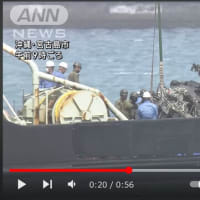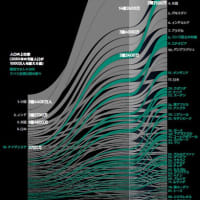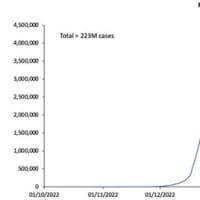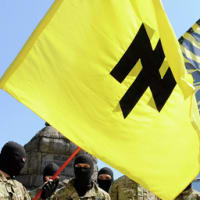当ブログで何度も指摘したように、中国の好戦的な本音が露骨に示された。
中国は21世紀のナチスなのだ。
日本は建国以来最大の危機に直面している。
全力で防衛力の強化に取り組まねばならない。
100年償還の防衛国債を毎年2兆円発行して、
核ミサイルを撃ち落とすための独自のミサイル迎撃システムを開発し、
敵基地攻撃能力としての巡航ミサイルを配備すべきだ。

http://www.zakzak.co.jp/society/foreign/news/20140217/frn1402171603006-n1.htm
「世界戦争も辞さず」に凍りついた会場 ダボス会議で出た中国の“本音”
米ウェブニュース「ビジネスインサイダー」の共同代表、ヘンリー・ブロジェット氏が1月22日付で掲載した。
舞台は非公開で開かれたディナー会合。各テーブルでマイクを回し、出席者は関心事について簡潔な質疑ができたという。
記事によると、この専門家は日中間の対立の背景を安倍晋三首相の靖国神社参拝に結びつけ、「戦争犯罪者を崇拝する行為で、クレイジーだ」と非難。一方、中国が日本を攻撃することで米国と事を構える事態は好ましくないとも述べた。
ところが驚くべきことに、「多くの中国人は、尖閣諸島への侵攻で軍事的な優位を見せつけ、このシンボル的な島を完全に支配できると信じている」と発言。尖閣諸島は限定的な侵攻で、国境紛争を引き起こすことなく支配が可能との考えを示唆したという。
さらに、尖閣侵攻は日本、中国ほか他の国々に対し、誰が強者なのかを示すシンボリックな価値があるとし、「日米の軍事的な対処で事態が大きな戦争につながっても、さほどひどいこととは思わない」という旨を述べたという。
テーブルの出席者は静まりかえり、マイクを握った参加者の1人が「岩だけで価値を持たない島のために世界戦争を起こす可能性を認識しているのか」と質問したところ、この専門家は「理解している」と回答。尖閣諸島はシンボル的な価値があると繰り返した。


<204年2月8日>
元記事
Someone Just Said Something About The Japan-China Conflict That Scared The Crap Out Of Everyone
I went to one of those fancy private dinners last night in Davos, Switzerland.
Like most of the events here at the 2014 World Economic Forum, the dinner was conducted under what are known as "Chatham House Rules," which means that I can't tell you who was there.
I can tell you what was said, though. And one thing that was said rattled a lot of people at the table.
During the dinner, the hosts passed a microphone around the table and asked guests to speak briefly about something that they thought would interest the group.
One of the guests, an influential Chinese professional, talked about the simmering conflict between China and Japan over a group of tiny islands in the Pacific.
China and Japan, you may recall, each claim ownership of these islands, which are little more than a handful of uninhabited rocks between Japan and Taiwan. Recently, the Japan-China tension around the islands has increased, and has led many analysts, including Ian Bremmer of the Eurasia Group, to worry aloud about the potential for a military conflict.
The Chinese professional at dinner last night did not seem so much worried about a military conflict as convinced that one was inevitable. And not because of any strategic value of the islands themselves (they're basically worthless), but because China and Japan increasingly hate each other.
The Chinese professional mentioned the islands in the context of the recent visit by Japan's Prime Minister Shinzo Abe to the Yasukuni Shrine in Tokyo. The Yasukuni Shrine is a Shinto shrine where Japanese killed in Japan's many military conflicts over the centuries are memorialized ― including the Japanese leaders responsible for the attacks and atrocities Japan perpetrated in World War 2. A modern-day Japanese leader visiting the Yasukuni Shrine is highly controversial, because it is viewed by Japan's former (and current) enemies as an act of honoring war criminals.
That's certainly the way the Chinese professional at the dinner viewed it.
He used the words "honoring war criminals," to describe Abe's visit to the shrine. And, with contained but obvious anger, he declared this decision "crazy."
He then explained that the general sense in China is that China and Japan have never really settled their World War 2 conflict. Japan and America settled their conflict, he explained, and as a result, the fighting stopped. But China and Japan have never really put the war behind them.
The Chinese professional acknowledged that if China asserted control over the disputed islands by attacking Japan, America would have to stand with Japan. And he acknowledged that China did not want to provoke America.
But then he said that many in China believe that China can accomplish its goals ― smacking down Japan, demonstrating its military superiority in the region, and establishing full control over the symbolic islands ― with a surgical invasion.
In other words, by sending troops onto the islands and planting the flag.
The Chinese professional suggested that this limited strike could be effected without provoking a broader conflict. The strike would have great symbolic value, demonstrating to China, Japan, and the rest of the world who was boss. But it would not be so egregious a move that it would force America and Japan to respond militarily and thus lead to a major war.
Well, when the Chinese professional finished speaking, there was stunned silence around the table.
The assembled CEOs, investors, executives, and journalists stared quietly at the Chinese professional. Then one of them, a businessman, reached for the microphone.
"Do you realize that this is absolutely crazy?" the businessman asked.
"Do you realize that this is how wars start?"
"Do you realize that those islands are worthless pieces of rock... and you're seriously suggesting that they're worth provoking a global military conflict over?"
The Chinese professional said that, yes, he realized that. But then, with conviction that further startled everyone, he said that the islands' value was symbolic and that their symbolism was extremely important.
Challenged again, the Chinese professional distanced himself from his earlier remarks, saying that he might be "sensationalizing" the issue and that he, personally, was not in favor of a war with Japan. But he still seemed certain that one was deserved.
I'm far from an expert on the Japan-China conflict, and I'll leave the analyses of this situation to those who are. All I can tell you is that a respected, smart, and influential Chinese professional suggested at dinner last night that a surgical invasion by China of the disputed islands is justified and would finally settle the Japan-China conflict without triggering a broader war. And that suggestion freaked out everyone in the room.
UPDATE: Around the time I published this post, Gideon Rachman of the Financial Times tweeted the following about an interview with Shinzo Abe, the Prime Minister of Japan. In case you've forgotten, 1914 is when World War 1 started.
Just interviewed Shinzo Abe @Davos. He said China and Japan now are in a "similar situation" to UK and Germany before 1914.
― Gideon Rachman (@gideonrachman) January 22, 2014
http://www.businessinsider.com/china-japan-conflict-could-lead-to-war-2014-1
中国は21世紀のナチスなのだ。
日本は建国以来最大の危機に直面している。
全力で防衛力の強化に取り組まねばならない。
100年償還の防衛国債を毎年2兆円発行して、
核ミサイルを撃ち落とすための独自のミサイル迎撃システムを開発し、
敵基地攻撃能力としての巡航ミサイルを配備すべきだ。

http://www.zakzak.co.jp/society/foreign/news/20140217/frn1402171603006-n1.htm
「世界戦争も辞さず」に凍りついた会場 ダボス会議で出た中国の“本音”
米ウェブニュース「ビジネスインサイダー」の共同代表、ヘンリー・ブロジェット氏が1月22日付で掲載した。
舞台は非公開で開かれたディナー会合。各テーブルでマイクを回し、出席者は関心事について簡潔な質疑ができたという。
記事によると、この専門家は日中間の対立の背景を安倍晋三首相の靖国神社参拝に結びつけ、「戦争犯罪者を崇拝する行為で、クレイジーだ」と非難。一方、中国が日本を攻撃することで米国と事を構える事態は好ましくないとも述べた。
ところが驚くべきことに、「多くの中国人は、尖閣諸島への侵攻で軍事的な優位を見せつけ、このシンボル的な島を完全に支配できると信じている」と発言。尖閣諸島は限定的な侵攻で、国境紛争を引き起こすことなく支配が可能との考えを示唆したという。
さらに、尖閣侵攻は日本、中国ほか他の国々に対し、誰が強者なのかを示すシンボリックな価値があるとし、「日米の軍事的な対処で事態が大きな戦争につながっても、さほどひどいこととは思わない」という旨を述べたという。
テーブルの出席者は静まりかえり、マイクを握った参加者の1人が「岩だけで価値を持たない島のために世界戦争を起こす可能性を認識しているのか」と質問したところ、この専門家は「理解している」と回答。尖閣諸島はシンボル的な価値があると繰り返した。


<204年2月8日>
元記事
Someone Just Said Something About The Japan-China Conflict That Scared The Crap Out Of Everyone
I went to one of those fancy private dinners last night in Davos, Switzerland.
Like most of the events here at the 2014 World Economic Forum, the dinner was conducted under what are known as "Chatham House Rules," which means that I can't tell you who was there.
I can tell you what was said, though. And one thing that was said rattled a lot of people at the table.
During the dinner, the hosts passed a microphone around the table and asked guests to speak briefly about something that they thought would interest the group.
One of the guests, an influential Chinese professional, talked about the simmering conflict between China and Japan over a group of tiny islands in the Pacific.
China and Japan, you may recall, each claim ownership of these islands, which are little more than a handful of uninhabited rocks between Japan and Taiwan. Recently, the Japan-China tension around the islands has increased, and has led many analysts, including Ian Bremmer of the Eurasia Group, to worry aloud about the potential for a military conflict.
The Chinese professional at dinner last night did not seem so much worried about a military conflict as convinced that one was inevitable. And not because of any strategic value of the islands themselves (they're basically worthless), but because China and Japan increasingly hate each other.
The Chinese professional mentioned the islands in the context of the recent visit by Japan's Prime Minister Shinzo Abe to the Yasukuni Shrine in Tokyo. The Yasukuni Shrine is a Shinto shrine where Japanese killed in Japan's many military conflicts over the centuries are memorialized ― including the Japanese leaders responsible for the attacks and atrocities Japan perpetrated in World War 2. A modern-day Japanese leader visiting the Yasukuni Shrine is highly controversial, because it is viewed by Japan's former (and current) enemies as an act of honoring war criminals.
That's certainly the way the Chinese professional at the dinner viewed it.
He used the words "honoring war criminals," to describe Abe's visit to the shrine. And, with contained but obvious anger, he declared this decision "crazy."
He then explained that the general sense in China is that China and Japan have never really settled their World War 2 conflict. Japan and America settled their conflict, he explained, and as a result, the fighting stopped. But China and Japan have never really put the war behind them.
The Chinese professional acknowledged that if China asserted control over the disputed islands by attacking Japan, America would have to stand with Japan. And he acknowledged that China did not want to provoke America.
But then he said that many in China believe that China can accomplish its goals ― smacking down Japan, demonstrating its military superiority in the region, and establishing full control over the symbolic islands ― with a surgical invasion.
In other words, by sending troops onto the islands and planting the flag.
The Chinese professional suggested that this limited strike could be effected without provoking a broader conflict. The strike would have great symbolic value, demonstrating to China, Japan, and the rest of the world who was boss. But it would not be so egregious a move that it would force America and Japan to respond militarily and thus lead to a major war.
Well, when the Chinese professional finished speaking, there was stunned silence around the table.
The assembled CEOs, investors, executives, and journalists stared quietly at the Chinese professional. Then one of them, a businessman, reached for the microphone.
"Do you realize that this is absolutely crazy?" the businessman asked.
"Do you realize that this is how wars start?"
"Do you realize that those islands are worthless pieces of rock... and you're seriously suggesting that they're worth provoking a global military conflict over?"
The Chinese professional said that, yes, he realized that. But then, with conviction that further startled everyone, he said that the islands' value was symbolic and that their symbolism was extremely important.
Challenged again, the Chinese professional distanced himself from his earlier remarks, saying that he might be "sensationalizing" the issue and that he, personally, was not in favor of a war with Japan. But he still seemed certain that one was deserved.
I'm far from an expert on the Japan-China conflict, and I'll leave the analyses of this situation to those who are. All I can tell you is that a respected, smart, and influential Chinese professional suggested at dinner last night that a surgical invasion by China of the disputed islands is justified and would finally settle the Japan-China conflict without triggering a broader war. And that suggestion freaked out everyone in the room.
UPDATE: Around the time I published this post, Gideon Rachman of the Financial Times tweeted the following about an interview with Shinzo Abe, the Prime Minister of Japan. In case you've forgotten, 1914 is when World War 1 started.
Just interviewed Shinzo Abe @Davos. He said China and Japan now are in a "similar situation" to UK and Germany before 1914.
― Gideon Rachman (@gideonrachman) January 22, 2014
http://www.businessinsider.com/china-japan-conflict-could-lead-to-war-2014-1




















※コメント投稿者のブログIDはブログ作成者のみに通知されます